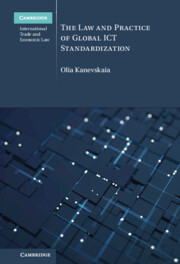Book contents
- The Law and Practice of Global ICT Standardization
- Cambridge International Trade and Economic Law
- The Law and Practice of Global ICT Standardization
- Copyright page
- Dedication
- Contents
- Tables
- Table of Cases
- Abbreviations
- Introduction
- Part I The Ecosystem of ICT Standardization
- Part II The Law of ICT Standardization
- Part III Governance Architecture and Decision-Making Process of SDOs
- Part IV Due Process in ICT Standardization
- 10 Case Studies on Dispute Resolution in SDOs
- 11 Tendencies and Best Practices in the Industry
- 12 Revisiting the Legitimacy of ICT Standardization
- Conclusion
- Annex I List of Interviews
- Bibliography
- Index
Conclusion
from Part IV - Due Process in ICT Standardization
Published online by Cambridge University Press: 09 February 2023
- The Law and Practice of Global ICT Standardization
- Cambridge International Trade and Economic Law
- The Law and Practice of Global ICT Standardization
- Copyright page
- Dedication
- Contents
- Tables
- Table of Cases
- Abbreviations
- Introduction
- Part I The Ecosystem of ICT Standardization
- Part II The Law of ICT Standardization
- Part III Governance Architecture and Decision-Making Process of SDOs
- Part IV Due Process in ICT Standardization
- 10 Case Studies on Dispute Resolution in SDOs
- 11 Tendencies and Best Practices in the Industry
- 12 Revisiting the Legitimacy of ICT Standardization
- Conclusion
- Annex I List of Interviews
- Bibliography
- Index
Summary
This chapter outlines the main findings of this book, placing them in the broader perspective of global ICT standardization. It discusses the arising challenges and sketches a broader legal, economic, and political outlook on due process in ICT standardization. In particular, this chapter provides a concise summary of the book’s main argument: if standards development organizations’ (SDOs) frameworks are to fall short on procedural guarantees, which is increasingly becoming the case due to the complexity and public function of their standards, there is little chance that their governance bodies will address the issue, which may result in lack of legitimacy in the ICT standardization ecosystem; this can be remedied, at least in part, by an “external” review of SDOs’ processes and decisions, (to be) conducted by industry experts, courts, or public law bodies. This chapter further provides recommendations and suggestions for improving both the existing regulatory framework and internal rules of SDOs, emphasizing, however, that any modifications of operational frameworks should take into account the specific sector in which these organizations operate.
- Type
- Chapter
- Information
- The Law and Practice of Global ICT Standardization , pp. 304 - 310Publisher: Cambridge University PressPrint publication year: 2023



